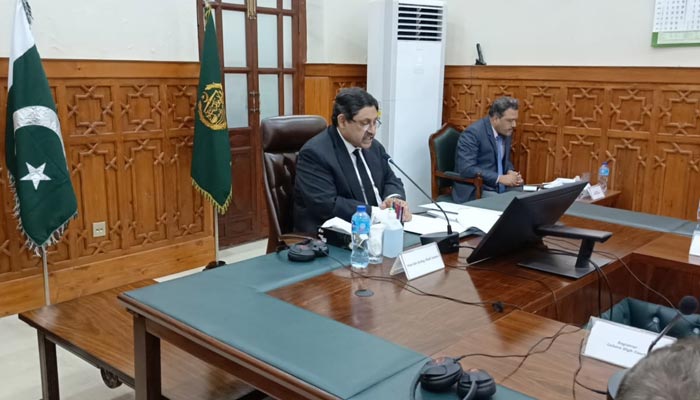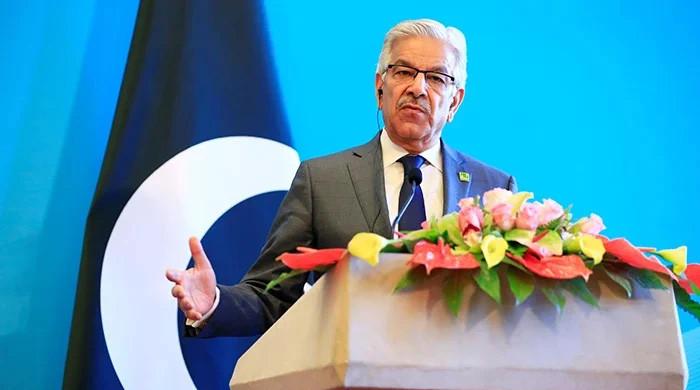LHC announces sweeping reforms to enhance public service delivery
Reforms aimed at improving the overall functioning of the judicial system
June 26, 2024

In a landmark move, the Lahore High Court has unveiled a comprehensive package of reforms aimed at revolutionising public service delivery, enhancing judicial efficiency, and IT-based initiatives, according to an official statement issued on Wednesday.
The reforms were announced during a meeting chaired by acting Chief Justice of Lahore High Court Shujaat Ali Khan on Wednesday, the statement said.

The meeting was attended by all the district & sessions judges of the Punjab via video link, while registrar LHC, Ch Abdul Rashid Abid, Director General District Judicial Abhar Gul Khan, Sessions Judge Human Resource Sajid Ali Awan, Director General Judicial & Case Management, Tanvir Akbar, District & Sessions Judge, Lahore, Syed Ali Imran, District & Sessions Judge, Bahawalnagar, Shazib Saeed and others were also present there.
The said reforms are designed to improve the overall functioning of the judicial system, provide better facilities to lawyers and litigants, and ensure the welfare of judges, court staff, and the general public.
Public service delivery
The acting LHC CJ stressed upon the enhancement of public service delivery, and issued directions for the establishment of comfortable waiting areas and clean toilet facilities, with a special focus on vulnerable sections of society.
QR-coded documents will be generated for easy access to judgments and orders, and an online complaint system will be integrated with the Lahore High Court’s mobile application, monitored through a dashboard.
The “Adlia Sahulat Centre” will be established with an aim to provide one-window facilities for lawyers and litigants, including case filing, early hearing applications, copy of MLC & FIR, certified copies of judicial records, case tracking, and attestation of petitions and digital comments from police will be implemented, and a dedicated portal for e-filing of 22 A & B petitions will be established.
Better coordination with the Bar
The reforms also include various welfare and goodwill measures for judges, court staff, and lawyers. A committee comprising sessions judges, DC, DPO, DSP Legal, and ADCG will meet monthly to address issues facing lawyers. Digital libraries will be established at Tehsil and District Bar levels.
Welfare and goodwill measures for judges and court staff include the implementation of a Human Resource Management System (HRMS), health screening, vaccination, and timely promotions, facilitation for education/treatment of children with special abilities of high court establishment and district judiciary staff through government health /educational institutions.
Institutional betterment
Several reforms on institutional betterment will also be introduced and for the purpose, courts will be uplifted to hear gender-based violence and overseas Pakistanis cases on a priority basis.
Reactivation of courts dealing with cases to overseas Pakistanis as they are a special component of our population representing Pakistan in the international arena. Special modules for judicial officers on ADR and mediation will be prepared.
Moreover, general training programmes for civil judges and additional district and sessions judges on better judgment writing will be conducted.
The acting LHC CJ has also shown his great commitment to working towards a paperless environment and for this purpose effective steps will be taken.
The judicial officers will be motivated and encouraged through certificates of appreciation and an elite panel of top performers, on the basis of one-year best performance, will be established comprising of the best sessions judge, best ASJ, SCJ and CJ.
Similarly, foolproof security of the premises of the high court, district court and residences of the judicial officers be assured, energy conservation measures by installation of solar technology be implemented and IT-based initiatives including the use of Artificial Intelligence (AI) as per the guidelines issued by the Chief Justice of Pakistan Qazi Faez Isa and senior puisne Judge Justice Syed Mansoor Ahi Shah, will be used for better supervision and disposal of cases.
Alternate Dispute Resolution (ADR) centres will be established in districts. Furthermore, the Case Management System (CMS) and Record Management System (RMS) already functioning in the district judicial will also be upgraded.











